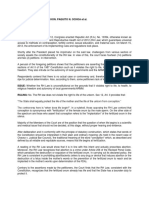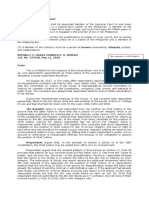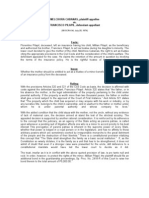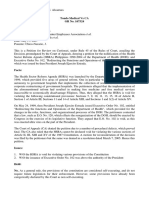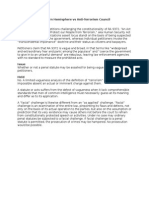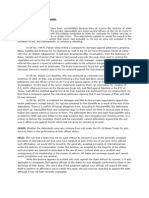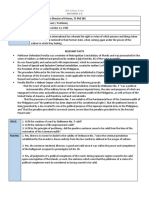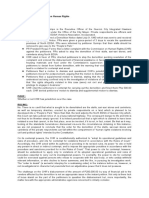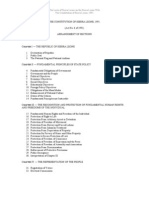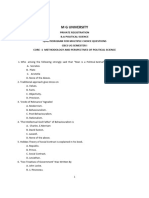Calalang vs. Williams (Digested Case)
Calalang vs. Williams (Digested Case)
Uploaded by
Amethyst Vivo TanioCopyright:
Available Formats
Calalang vs. Williams (Digested Case)
Calalang vs. Williams (Digested Case)
Uploaded by
Amethyst Vivo TanioOriginal Title
Copyright
Available Formats
Share this document
Did you find this document useful?
Is this content inappropriate?
Copyright:
Available Formats
Calalang vs. Williams (Digested Case)
Calalang vs. Williams (Digested Case)
Uploaded by
Amethyst Vivo TanioCopyright:
Available Formats
Group 6 Digest
Calalang vs. Williams
G.R. No. 47800 December 2, 1940
Petitioner: Maximo Calalang
Respondents: A.D. Williams, Et al.
Ponente: Laurel, J:
Facts:
Maximo Calalang in his capacity as a private citizen and a taxpayer of Manila filed a
petition for a writ of prohibition against the respondents.
It is alleged in the petition that the National Traffic Commission, in its resolution of July
17, 1940, resolved to recommend to the Director of the Public Works and to the Secretary of
Public Works and Communications that animal-drawn vehicles be prohibited from passing
along Rosario Street extending from Plaza Calderon de la Barca to Dasmariñas Street from 7:30
Am to 12:30 pm and from 1:30 pm to 530 pm; and along Rizal Avenue extending from the
railroad crossing at Antipolo Street to Echague Street from 7 am to 11pm for a period of one year
from the date of the opening of the Colgante Bridge to traffic.
The Chairman of the National Traffic Commission on July 18, 1940 recommended to the
Director of Public Works with the approval of the Secretary of Public Works the adoption of the
measure proposed in the resolution aforementioned in pursuance of the provisions of the
Commonwealth Act No. 548 which authorizes said Director with the approval from the
Secretary of the Public Works and Communication to promulgate rules and regulations to
regulate and control the use of and traffic on national roads.
On August 2, 1940, the Director recommended to the Secretary the approval of the
recommendations made by the Chairman of the National Traffic Commission with
modifications. The Secretary of Public Works approved the recommendations on August 10,
1940.
The Mayor of Manila and the Acting Chief of Police of Manila have enforced and caused
to be enforced the rules and regulation. As a consequence, all animal-drawn vehicles are not
allowed to pass and pick up passengers in the places above mentioned to the detriment not only
of their owners but of the riding public as well.
Issue:
1. Whether the rules and regulations promulgated by the respondents
pursuant to the provisions of Commonwealth Act NO. 548 constitute
an unlawful inference with legitimate business or trade and abridged
the right to personal liberty and freedom of locomotion?
2. Whether the rules and regulations complained of infringe upon the
constitutional precept regarding the promotion of social justice to
insure the well-being and economic security of all the people?
Held:
1. No. The promulgation of the Act aims to promote safe transit upon and avoid
obstructions on national roads in the interest and convenience of the public. In
enacting said law, the National Assembly was prompted by considerations of
public convenience and welfare. It was inspired by the desire to relieve
congestion of traffic, which is a menace to the public safety. Public welfare lies
at the bottom of the promulgation of the said law and the state in
order to promote the general welfare may interfere with personal
liberty, with property, and with business and occupations. Persons and
property may be subject to all kinds of restraints and burdens in order to secure
the general comfort, health, and prosperity of the State. To this fundamental
aims of the government, the rights of the individual are subordinated. Liberty is
a blessing which should not be made to prevail over authority because society
will fall into anarchy. Neither should authority be made to prevail over liberty
because then the individual will fall into slavery. The paradox lies in the fact
that the apparent curtailment of liberty is precisely the very means of
insuring its preserving.
2. No. Social justice means the promotion of the welfare of all the people, the
adoption by the Government of measures calculated to insure economic stability
of all the competent elements of society, through the maintenance of a proper
economic and social equilibrium in the interrelations of the members of the
community, constitutionally, through the adoption of measures legally justifiable,
or extra-constitutionally, through the exercise of powers underlying the existence
of all governments on the time-honored principles of salus populi est
suprema lex.
Social justice must be founded on the recognition of the necessity of
interdependence among divers and diverse units of a society and of the
protection that should be equally and evenly extended to all groups as a
combined force in our social and economic life, consistent with the fundamental
and paramount objective of the state of promoting health, comfort and quiet of
all persons, and of bringing about “the greatest good to the greatest number.”
THE PETITION IS DENIED WITH COSTS AGAINST THE PETITIONER.
You might also like
- Case Digest of People Vs PerfectoDocument2 pagesCase Digest of People Vs PerfectoMarita Fe Buslig-Masirag100% (14)
- Digest-Imbong V OchoaDocument2 pagesDigest-Imbong V OchoaLara Michelle Sanday Binudin100% (13)
- Macariola v. Asuncion (Case Digest)Document2 pagesMacariola v. Asuncion (Case Digest)Ivy Eunice Estorba75% (4)
- Republic v. Sereno DIGESTDocument5 pagesRepublic v. Sereno DIGESTJor Lonzaga100% (7)
- Calalang v. Williams, G.R. No. 47800, December 2, 1940Document4 pagesCalalang v. Williams, G.R. No. 47800, December 2, 1940Dominique Vasallo100% (7)
- Cabanas vs. Pilapil (CASE DIGEST)Document1 pageCabanas vs. Pilapil (CASE DIGEST)Deus Dulay86% (7)
- People vs. Lagman DigestDocument1 pagePeople vs. Lagman DigestChic Pabalan100% (4)
- Case Digest: Eastern Shipping vs. POEADocument3 pagesCase Digest: Eastern Shipping vs. POEAbeaflauta82% (11)
- Calalang vs. WilliamsDocument2 pagesCalalang vs. WilliamsMan2x Salomon77% (13)
- Tañada V Angara DigestDocument2 pagesTañada V Angara Digestkimoymoy793% (28)
- Vinuya Vs Executive SecretaryDocument1 pageVinuya Vs Executive SecretaryAyban Nabatar100% (3)
- 02 Tondo Medical V CADocument2 pages02 Tondo Medical V CAAnonymous fnlSh4KHIg75% (8)
- Arigo V. Swift Case DigestDocument4 pagesArigo V. Swift Case DigestAnonymous w5uMxeEvT100% (4)
- Simone Weil Struggling For JusticeDocument10 pagesSimone Weil Struggling For JusticeashfaqamarNo ratings yet
- CALALANG Vs Williams DigestDocument2 pagesCALALANG Vs Williams DigestAnjelyn Conor Ballon100% (2)
- Digest Govt of The Phil Islands Vs Monte de PiedadDocument2 pagesDigest Govt of The Phil Islands Vs Monte de PiedadArlando G. Arlando100% (3)
- Case Digest - MMDA V Concerned Residents of Manila BayDocument3 pagesCase Digest - MMDA V Concerned Residents of Manila BayJessica Vien Mandi91% (11)
- Marcos vs. Manglapus Case DigestDocument2 pagesMarcos vs. Manglapus Case DigestFrancesMargaretQuitco96% (23)
- G.R. No. 217872Document2 pagesG.R. No. 217872Marj Lo100% (1)
- Ichong vs. Hernandez (Digest)Document5 pagesIchong vs. Hernandez (Digest)AJ Aslarona85% (13)
- Southern Hemisphere Vs Anti-Terrorism CouncilDocument1 pageSouthern Hemisphere Vs Anti-Terrorism CouncilRochelle Ayad50% (2)
- Government v. Monte de Piedad - G.r.no.l-9959 - Floren, JensenDocument1 pageGovernment v. Monte de Piedad - G.r.no.l-9959 - Floren, JensenJen0% (1)
- Marine Radio Comm'n Assoc'n vs. Reyes, 191 SCRA 205Document1 pageMarine Radio Comm'n Assoc'n vs. Reyes, 191 SCRA 205Dénise Rafaël100% (2)
- Garcia v. Drilon Case DigestDocument2 pagesGarcia v. Drilon Case DigestCesca Balasbas100% (13)
- The Provincial Bus Operators Association of The Philippines (PBOAP) Et Al Vs DOLE and LTFRBDocument2 pagesThe Provincial Bus Operators Association of The Philippines (PBOAP) Et Al Vs DOLE and LTFRBHarvey Leo Romano100% (4)
- 61 RP V .N Dela MercedDocument2 pages61 RP V .N Dela MercedVanityHugh100% (3)
- Adriano Vs Tanco AgraDocument2 pagesAdriano Vs Tanco AgraCarla VirtucioNo ratings yet
- NEA Vs MORALES (Case Digest by Buenaventura)Document2 pagesNEA Vs MORALES (Case Digest by Buenaventura)NocQuisaotNo ratings yet
- Hacienda Luisita Vs PARC DigestDocument3 pagesHacienda Luisita Vs PARC DigestMegan Mateo100% (3)
- People Vs Gozo DigestDocument1 pagePeople Vs Gozo DigestAdriel Magpile0% (2)
- Salonga Vs Farrales Digest Ful CaseDocument6 pagesSalonga Vs Farrales Digest Ful Casemarwantahsin100% (1)
- Compare and Contract Liberalism and Conservatism Political Ideologies - EditedDocument10 pagesCompare and Contract Liberalism and Conservatism Political Ideologies - EditedCarole MweuNo ratings yet
- How Patterns Preserve LibertyDocument3 pagesHow Patterns Preserve LibertyJanVen SabellinaNo ratings yet
- Seafdec Vs NLRCDocument1 pageSeafdec Vs NLRCKaren GinaNo ratings yet
- Calalang vs. Williams (70 Phil 726) Case DigestDocument1 pageCalalang vs. Williams (70 Phil 726) Case DigestCarlota Nicolas Villaroman100% (1)
- Espina Vs ZamoraDocument2 pagesEspina Vs ZamoraSecret Student83% (6)
- Pasei Vs Drilon Case Digest PDFDocument2 pagesPasei Vs Drilon Case Digest PDFZarah Canlas100% (2)
- Case Digest Republic Vs SandovalDocument4 pagesCase Digest Republic Vs SandovalNeil bryan Moninio100% (2)
- Hon. Executive Vs SouthwingDocument2 pagesHon. Executive Vs Southwinghello_hoarder100% (5)
- 13 Sameer Overseas Placement Vs Cabiles Case Digest PDFDocument16 pages13 Sameer Overseas Placement Vs Cabiles Case Digest PDFrafNo ratings yet
- Eastern Shipping Lines Vs POEADocument2 pagesEastern Shipping Lines Vs POEAMaria Lovella M. CapellanNo ratings yet
- Espina V Zamora (GR No 143855) DigestDocument1 pageEspina V Zamora (GR No 143855) DigestJose Ramon Ampil100% (3)
- Francisco Vs House of Representatives Case DigestDocument2 pagesFrancisco Vs House of Representatives Case DigestKeziah Cyra Papas50% (2)
- United States of America vs. GuintoDocument2 pagesUnited States of America vs. GuintoMa Gloria Trinidad Arafol100% (6)
- SSS Vs CA (GR No. L-41299, Feb 21, 1983)Document1 pageSSS Vs CA (GR No. L-41299, Feb 21, 1983)jneNo ratings yet
- Free Telephone Workers Union vs. Ministry of LaborDocument2 pagesFree Telephone Workers Union vs. Ministry of LaborJules BaldonNo ratings yet
- UP vs. DizonDocument4 pagesUP vs. DizonJade Marlu DelaTorre100% (1)
- Lambino Vs Comelec Case Digest G R No 174153Document1 pageLambino Vs Comelec Case Digest G R No 174153Aljay Labuga83% (6)
- Bi vs. Provincial Board of Mindoro (G.R. No. L-14078, March 7, 1919) Section 1.CDDocument2 pagesBi vs. Provincial Board of Mindoro (G.R. No. L-14078, March 7, 1919) Section 1.CDGol LumNo ratings yet
- 75 Phil 285-Peralta vs. Director of Prisons-DigestDocument2 pages75 Phil 285-Peralta vs. Director of Prisons-DigestDenee Vem MatorresNo ratings yet
- Greco Belgica Vs Executive SecretaryDocument3 pagesGreco Belgica Vs Executive Secretarykathygvas100% (3)
- Simon, Jr. vs. CHR, G.R. No. 100150 (Case Digest)Document1 pageSimon, Jr. vs. CHR, G.R. No. 100150 (Case Digest)AycNo ratings yet
- Pamatong Vs COMELEC DigestDocument2 pagesPamatong Vs COMELEC Digestapplewithme100% (3)
- Amigable vs. Cuenca DigestDocument2 pagesAmigable vs. Cuenca Digestunbeatable38100% (5)
- PLDT v. NLRCDocument2 pagesPLDT v. NLRCxxxaaxxx100% (1)
- Romualdez-Yap v. CSCDocument2 pagesRomualdez-Yap v. CSCRaymond Roque100% (1)
- Seafdec Vs NLRC DigestDocument1 pageSeafdec Vs NLRC Digestabakada_kaye100% (1)
- Sanders vs. Veridiano Case DigestDocument2 pagesSanders vs. Veridiano Case Digestunbeatable3886% (7)
- German Agency For Technical Cooperation Vs CADocument2 pagesGerman Agency For Technical Cooperation Vs CAVirgil SawNo ratings yet
- Calalang Vs Williams Digested CaseDocument2 pagesCalalang Vs Williams Digested CaseKristanne Louise Yu100% (1)
- 1 Calalang-vs-WilliamDocument6 pages1 Calalang-vs-WilliamCJ FaNo ratings yet
- Calalang v. Williams G.R. 47800, December 2, 1940 - Constitutional LawDocument6 pagesCalalang v. Williams G.R. 47800, December 2, 1940 - Constitutional LawrafNo ratings yet
- Maximo Calalang V A.D. Williams G.R. No. 47800. December 2, 1940Document3 pagesMaximo Calalang V A.D. Williams G.R. No. 47800. December 2, 1940Danica Irish RevillaNo ratings yet
- Ethics CaseDocument7 pagesEthics CaseAmethyst Vivo TanioNo ratings yet
- DEL CASTILLO Cases Sept. 11, 2009 - January 10, 2010Document164 pagesDEL CASTILLO Cases Sept. 11, 2009 - January 10, 2010Amethyst Vivo TanioNo ratings yet
- Barredo vs. GarciaDocument18 pagesBarredo vs. GarciaAmethyst Vivo TanioNo ratings yet
- Labrel CasesDocument151 pagesLabrel CasesAmethyst Vivo TanioNo ratings yet
- Quo and Adopted by Respondent Court, Appears of RecordDocument43 pagesQuo and Adopted by Respondent Court, Appears of RecordAmethyst Vivo TanioNo ratings yet
- Erectors vs. NLRCDocument2 pagesErectors vs. NLRCAmethyst Vivo Tanio100% (3)
- (DOMENICO LOSURDO) The Tangled Paradox of LiberalismDocument5 pages(DOMENICO LOSURDO) The Tangled Paradox of LiberalismLucas LimaNo ratings yet
- Mintzberg Henry - Rebalancing SocietyDocument130 pagesMintzberg Henry - Rebalancing SocietyMarcelo GómezNo ratings yet
- MolnarDocument8 pagesMolnarMaDzik MaDzikowskaNo ratings yet
- Family Essay: Summary: Discusses The Importance of Family. Explores The Writer's FamilyDocument12 pagesFamily Essay: Summary: Discusses The Importance of Family. Explores The Writer's FamilyRodica Curcudel100% (1)
- MontesquieuDocument4 pagesMontesquieuThetis SkondraNo ratings yet
- Fulton Sheen FBI File - Speech To The American Legion, 1957Document4 pagesFulton Sheen FBI File - Speech To The American Legion, 1957Matt Truppe100% (2)
- Social Contract Theory: Submitted To Mr. Kamal NarayanDocument13 pagesSocial Contract Theory: Submitted To Mr. Kamal NarayanAnantHimanshuEkkaNo ratings yet
- 21 Charts That Explain American Values Toda1Document26 pages21 Charts That Explain American Values Toda1Peggy W SatterfieldNo ratings yet
- PSC 20800 SyllabusDocument8 pagesPSC 20800 SyllabusCaleb KreegerNo ratings yet
- AALS Law and Religion Section NewsletterDocument29 pagesAALS Law and Religion Section NewsletterHoward FriedmanNo ratings yet
- RK Laxman Freedom To SpeakDocument25 pagesRK Laxman Freedom To SpeakSachin Ketkar100% (1)
- Constitution 1991Document81 pagesConstitution 1991tapia4yeabuNo ratings yet
- AT Afro PessDocument15 pagesAT Afro PessEvan JackNo ratings yet
- Understanding Human ActsDocument28 pagesUnderstanding Human Actsjohn michael alondeNo ratings yet
- Chavez vs. GonzalezDocument20 pagesChavez vs. GonzalezStephanie Reyes GoNo ratings yet
- Maneka Gandhi V Union of IndiaDocument90 pagesManeka Gandhi V Union of IndiaDEVAPREETI SHARMANo ratings yet
- Topic 1: Rawl's Justice As Fairness PrincipleDocument4 pagesTopic 1: Rawl's Justice As Fairness PrincipleHarold GarciaNo ratings yet
- Thomas Jefferson QuotesDocument2 pagesThomas Jefferson QuotesMattJhsn100% (5)
- Week9-Elgin F. Hunt, David C. Colander - Social Science - An Introduction To The Study of Society-Routledge (2016) (Dragged)Document22 pagesWeek9-Elgin F. Hunt, David C. Colander - Social Science - An Introduction To The Study of Society-Routledge (2016) (Dragged)MuhammetNo ratings yet
- Right To PrivacyDocument16 pagesRight To PrivacyReddy NarendraNo ratings yet
- Sodapdf MergedDocument95 pagesSodapdf MergedCode with KhanNo ratings yet
- Reduced Poli and PIL ReviewerDocument82 pagesReduced Poli and PIL Reviewerratsky89 thegreatNo ratings yet
- Concept of Human Rights PDFDocument23 pagesConcept of Human Rights PDFhlogiNo ratings yet
- 2 Principles of DemocracyDocument22 pages2 Principles of DemocracyKrisha Joy CofinoNo ratings yet
- Precinct Organizer PresentationDocument24 pagesPrecinct Organizer PresentationAlexander SnitkerNo ratings yet
- Transcendentalism in WhitmanDocument3 pagesTranscendentalism in Whitmantanmoybaghira100% (1)
- What Is Social JusticeDocument209 pagesWhat Is Social JusticeWang Da XiaNo ratings yet

